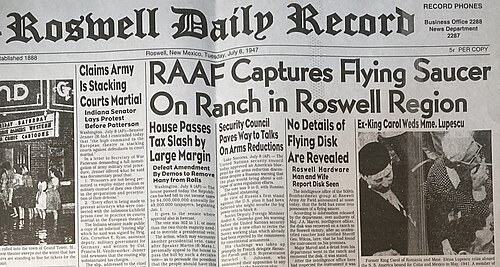- The term UFO, which stands for Unidentified Flying Object, refers to any aerial sighting or object that cannot be immediately identified or explained. Although the term has often been associated with extraterrestrial spacecraft, it simply describes any flying phenomenon that defies known classification at the time of observation.
Countries across the globe are today marking World unidentified flying objects (UFO) Day, an annual observance aimed at raising awareness on UFOs and calling for transparency on unexplained aerial phenomena. Celebrated annually on July 2, the day commemorates the 1947 Roswell incident in New Mexico—an event that remains central to global UFO discourse.
The term UFO, which stands for Unidentified Flying Object, refers to any aerial sighting or object that cannot be immediately identified or explained. Although the term has often been associated with extraterrestrial spacecraft, it simply describes any flying phenomenon that defies known classification at the time of observation.
World UFO Day was first established in 2001 by Turkish researcher Haktan Akdogan to promote awareness and to advocate for the release of classified information relating to UFOs. While some enthusiasts also observe June 24—marking pilot Kenneth Arnold’s 1947 sighting of what he described as “flying saucers”—the more widely recognized date is July 2, linked to the Roswell incident, where a mysterious object crashed on a ranch near Roswell, New Mexico.

Read More
Though the U.S. military later stated it was a weather balloon, the event has remained the subject of speculation and alternative theories for decades.
In recent years, the U.S. government has publicly released videos and reports from military pilots documenting encounters with objects that demonstrate advanced maneuverability and no clear explanation. Similar investigations have been opened in countries including Canada, Japan, and France.
In Kenya and elsewhere, enthusiasts are expected to mark the day with sky-watching sessions, documentaries, and online forums exploring famous sightings and declassified materials. While no formal government inquiry into UFOs has been reported locally, interest in the topic has grown through global media and the availability of international research.
Organizers behind World UFO Day stress that the observance is not about proving the existence of aliens, but rather about promoting critical inquiry, scientific exploration, and government accountability. They call on space agencies and defence departments to make UFO-related data public to allow for open, evidence-based discussion.
As the day progresses into nightfall, many around the world will turn their eyes to the skies—whether out of belief, curiosity, or simple wonder. For supporters of the initiative, World UFO Day is a reminder that the unknown still has a place in modern dialogue, and that the search for answers continues, not in science fiction, but in the realm of scientific possibility.












